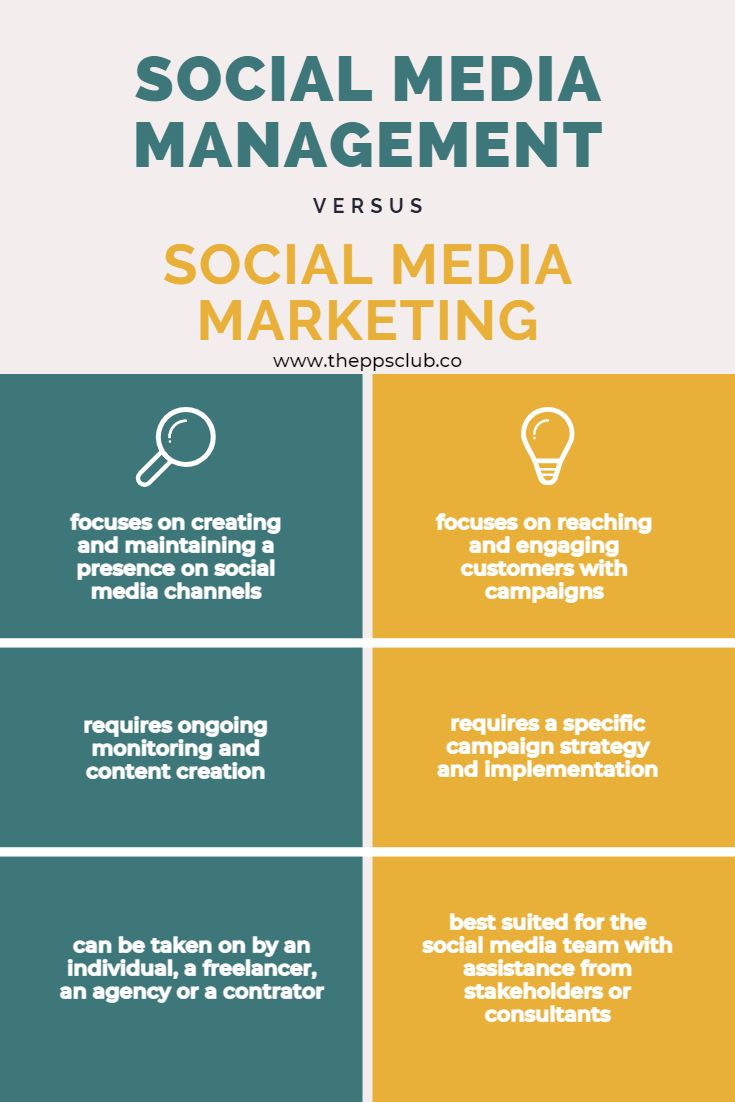Social Media Management vs Social Media Marketing - What's the Difference?

Social media management and social media marketing are two terms often used interchangeably, but they are actually two different activities. Social media management is about managing your presence on social media platforms, while social media marketing is about leveraging those platforms to market and promote your business.
Understanding the difference between the two can help you make the most of your social media efforts.
What is Social Media Marketing?
Social Media Marketing is the marketing discipline that allows you to promote products and services through social media networks. This discipline can be broken down into three essential activities:
1. Creating strategies to drive sales for your business
Strategy is a very important part of social media marketing. Without a strategy, all you will do is throw ideas at a wall and hope something sticks. Having a good social media marketing strategy gives you a good head start at making sales through social media.
A good strategy requires first knowing which social media platforms to use before coming up with campaign ideas and deciding the brand’s tone and voice for those campaigns and which type of content to post and the best times to post.
2. Creating campaigns to promote products or services
Next, you will need to create and implement those campaigns with the help of a team to handle content creation, content curation, design, media buying, community management, etc. Running successful social media campaigns is often easier with user-generated content (UGC) and these can be collected through astute social listening and monitoring, using social media listening and monitoring tools.
3. Listening and monitoring analytics to measure the effectiveness of campaigns
Social monitoring and social listening are the backbone of any successful social media marketing campaign. From monitoring hashtags and UGC, to tracking conversions using UTM metrics, to watching the competition, you need to constantly monitor those numbers and conversations to ensure your strategy is working and to change whatever isn’t working or else you will lose money.
What is Social Media Management?
Social media management deals with the day-to-day activities related to maintaining a consistent social media presence for a brand. This is often difficult to do without a strategy, hence, social media managers often double as social media strategists depending on their niche, experience, and whether they work as self-employed individuals or as part of a company’s social media team.
Social media management can be sectioned into four tasks:
1. Managing a company’s social media accounts
Doing things such as responding to comments and messages, creating content, and making sure the brand is as visible as possible is an essential part of social media management.
2. Developing a social media plan and maintaining posting schedules
Without a plan, it is almost impossible to stay consistent, especially when the creative juices aren’t flowing. To ensure that a brand will not suffer the pain of losing attention from potential customers, social media managers create a plan that they fill up with content such as creatives, copy, and hashtags that match the content strategy.
Then, with a content plan, the next step will be to schedule variations of posts on a content calendar that supports each social media platform they manage.
3. Creating content to post on social media channels
Creating content such as images, infographics and video is also an essential part of social media management. Sometimes a social media manager might outsource certain parts of this job to a graphic designer or video editor, but they are responsible for creating useful, entertaining, educational, or empowering content that will keep the brand’s audience engaged.
4. Monitoring and reporting on social media KPIs
It is common knowledge that you can’t manage what you can’t measure. Social media reports are essential for measuring the effectiveness of social media campaigns, using Key Performance Indicators or KPIs such as impressions and engagement, depending on your content goals or conversions depending on your business goals.
Differences between Social Media Management and Social Media Marketing
The differences between social media management and social media marketing lie within the purpose of each discipline, as well as who is best suited for the job. The following table highlights the key differences between Social Media Marketing and Social Media Management comprehensively:

Why should your company invest in a Social Media Management service?
How does a Social Media Manager work?
Social media management is focused on the day-to-day activities such as responding to comments, creating content, and managing the company’s overall social media presence.
A good social media manager possesses a deep understanding of brand storytelling and its significance in conveying the essence and values of a brand. They comprehend the power of narratives and use their expertise to craft compelling stories that resonate with the target audience.
This requires an acute eye for detail, as they meticulously analyze the brand's identity, values, and objectives to create a cohesive and authentic narrative that reflects the brand's essence.
In their role, social media managers are not just mere content creators or curators; they are skilled storytellers who know how to captivate and engage the audience. They understand that effective storytelling on social media requires a delicate balance of creativity, strategy, and audience insight.
With their eye for detail, social media managers pay attention to every element of their content, including visuals, language, tone, and timing. They understand that even the smallest details can make a significant impact on how the brand is perceived online.
By handpicking the right visuals, colors, and fonts, they ensure that the content aligns with the brand's visual identity and evokes the desired emotions. They also meticulously craft the language and tone of their posts, ensuring that it resonates with the target audience and accurately represents the brand's voice.
Social media managers understand that social media is a two-way communication channel, and they actively listen and respond to their audience's needs, opinions, and feedback. They create a sense of community by fostering conversations, asking questions, and encouraging user-generated content.
By being attentive and responsive, they build trust and loyalty among their audience, establishing a strong and lasting connection between the brand and its followers.
Furthermore, working with a freelance or contract social media manager can be a cost-effective way to ensure your social media duties are taken care of by someone widely experienced in your niche while you enjoy the massive returns on your investment. They typically charge a reasonable price for their services and you can always test their skills or contact their past clients/employers to verify their claims.
Overall, a good social media manager's eye for detail plays a crucial role in effectively conveying your brand's story and engaging your audience online. Through their meticulous attention to every aspect of brand storytelling and their thoughtful approach to audience engagement, they can create a compelling and authentic social media presence that resonates with the target audience and strengthens your brand's identity and reputation.
Conclusion
Social media management and marketing are both important for companies looking to reach and engage with customers. It is common for small businesses to delay investing in their social media presence, only to lose incredible opportunities due to neglecting this important aspect of doing business these days.
If your company or small business wants to invest in social media management, a good place to start would be to hire an experienced social media manager.
The author of this blog post is a freelance social media manager. Her experience managing social media accounts spans across the major platforms namely Instagram, Twitter, LinkedIn, Facebook, and other platforms as she strives to stay up-to-date on the latest innovations and trends to best serve her clients.
As a certified social media marketer, she understands the need to have a content strategy that matches your company’s business goals. If you aren’t sure which platforms are best suited for your business, and need someone to manage all your accounts, you can reach out to her through the contact form on this website.
About the author:
Priscille B. Fatuma is a writer, editor, content creator, and digital marketer. Her specialties include content and social media marketing, writing short and long form content. Her mission is to create memorable experiences to help connect brands and their audiences through purpose-driven storytelling. You can connect with her on Instagram and Twitter, or by subscribing to her bi-weekly newsletter, The PPS Club.
← What to read next: How to choose the right format for your email newsletter
Subscribe to The PPS Club to receive exclusive content and updates
Thank you for subscribing!
Have a great day!
